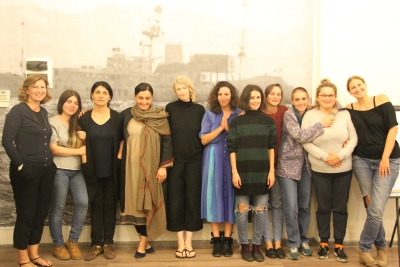Georgian Women Photographers to Focus on Sexual Harassment in the Workplace
Date:
What is sexual harassment in the workplace? How can be sexual harassment captured by means of photography? What ethical considerations should be taken into account when working on such sensitive issue? How to technically capture and edit a picture, so that it talks directly and unambiguously to the viewer? These and other questions were discussed at a workshopheld at the outskirts of the Tbilisi Photo Festival (September 21 – 24, 2016), and led by the British Photographer Alixandra Fazzina, a well-accomplished and an award winning member of Noor Photo Agency and Foundation.

Sexual Harassment in the Workplace Photography Workshop; Photo: UN Women
“Documentary and artistic photography can greatly contribute to uncovering unseen or taboo topics” noted Mzia Saganelidze, a participant of the workshop. “Many of us may fail to realize that have been exposed to sexual harassment, because we are simply used to sexist remarks or behavior. It is, however, time to start questioning what is and what is not appropriate communication between colleagues at work place, and try also to visualize it. The workshop has definitely helped to realize that the problem exists and is unaddressed. Picturing sexual harassment at work place in non-explicit way is not an easy task. Yet,I strongly believe that photography has the power to speak about everything”.
“We know each other, but have never before worked as a team,” said Leli Blagonravova. A photographer who is known for her work in covering human rights and social issues. “I believe we can do a lot together to raise awareness of the problem. We plan continue working on our ideas developed during the workshop and present our works to public later this year”.
“We planto benefit from creative ideas presented in the end of the workshop. We aim at bringing the issue –captured through the eyes of Georgian female photographers, to the places where the photos will speak out -- including to law-makers and employers. We know, it can be powerful and empowering. We have done it before and learned that art, including photography, can help to acceleratea positive change in lives of women”, commented Erika Kvapilova, UN Women Country Representative.
Tbilisi Photo Festival (since 2010), is one of the most important international cultural events in the South Caucasus. Each year, the festival attracts internationally renowned photographers, experts of photography, curators, and photo editors of international magazines and newspapers, and it hosts exhibitions of top-class photographers, educational events, and a popular event known as the Night of Photography in the capital of Georgia. Tbilisi Photo Festival aims to raisepublic awareness of social, economic and political issues through the use of photography. The cooperation between UN Women and Tbilisi Photo Festival began in 2015., when UN Women supported a round table that brought together prominent female photographers from several countries, titled “Are women changing photography?”